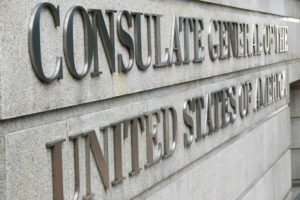The glorious sun is shining bright. The smooth silky sky is the most beautiful shade of blue anyone has ever seen and every drifting cloud looks like blooming hearts. You’ve got that silly sucker smile strapped to your face and Your mind is stuck on 1 person day and night. You’re in love and You have never felt so alive!
Now your back home and the love of your life is back in his/her home and reality has struck and you realize that you are oceans apart from the only one you want to spend the rest of your life with. You are a U.S. Citizen…. and she/he is not….. You can’t imagine being separated for almost 1.5 years waiting for him/her to get a green card via the Immigrant Visa petition before coming to the U.S. What could you possibly do now???
Well, this is where I, the managing attorney of The Law Office of Jessie M. Thomas, can assist.
Let me propose to you the K1 Alien Fiancé Visa Petition I-129F which generally takes less than half the amount of time. This also happens to be one of my favorite immigration subjects.
The K1 Alien Fiancé Visa Petition I-129F allows your foreign citizen fiancé to travel to the United States and marry you here. But there are some requirements that must be met.
First of all you must be a U.S. Citizen. This route cannot be used by green card holders and you must have met your fiancé face to face within the last 2 years prior to filing the K1 Alien Fiancé Visa Petition I-129F. In very limited circumstances USCIS can waive the meeting requirement. It is usually based on religious/cultural reasons or extreme hardship as the reason why you have not met your fiancé in the last 2 years. A very subjective test is used and you must be able to convince USCIS.
You must also show that you and your fiancé intend to get married within 90 days of his/her arrival- no excuses. If you both do not get married to each other within this timeframe then your fiancé (probably your ex-fiancé by that point) must leave the country immediately. Also note that your fiancé cannot change her mind and marry someone else while on this K1 fiancé visa that YOU filed for him/her.
You must be able to prove that you both are legally free to get married at the time of filing the K1 Alien Fiancé Visa Petition I-129F and that your marriage is legal in the United States in the state where you plan to get married.
Since the K1 Alien Fiancé Visa is also a high fraud category, government officials will be scrutinizing each K1 Alien Fiancé Visa Petition I-129F case that comes before them. Keep in mind that if these highly trained officials find out there is fraud involved you can be incarcerated for upto 5 years and/or be forced to pay a $250,000 fine. In short, do not use the K1 Fiancé Visa process illegally or in bad faith.
If you truly want to bring your fiancé to the U.S. as quickly as legally possible and you have a bona fide relationship with your fiancé then The Law Office of Jessie M. Thomas will guide you quickly and correctly from the K1 Alien Fiancé Visa filing to the NVC consular processing portion to the adjustment of status process until your fiancé gets the green card in hand.
USCIS fees are going to be increased from the current $340 to $535 on December 23, 2016. The legal fees for The Law Office Of Jessie M. Thomas are separate and will depend on the complexity of each individual case. However we offer one of the lowest fees around and offer flexible payment plans that most attorneys would never offer.
If you are interested in hiring the Law Office of Jessie M. Thomas to handle your K1 Alien Fiancé petition filing or any other immigration related filing, please contact us for a free evaluation and fee quote by visiting our website and filling out a Contact Us Form or by emailing ContactUs@StayLegally.com or by calling (214) 838-0045.
 The American Institute Of Legal Counsel (AIOLC) has recognized the exceptional performance of Texas Immigration Attorney Jessie M. Thomas as 2017 “10 Best Immigration Attorney” for Client Satisfaction.
The American Institute Of Legal Counsel (AIOLC) has recognized the exceptional performance of Texas Immigration Attorney Jessie M. Thomas as 2017 “10 Best Immigration Attorney” for Client Satisfaction. The American Institute Of Legal Counsel is a third-party attorney rating organization that publishes an annual list of Top 10 Immigration Attorneys in each state. Attorneys who are selected to the “10 Best” list must pass AIOLC’s rigorous selection process, which is based on client and/or peer nominations, thorough research, and AIOLC’s independent evaluation. AIOLC’s annual list was created to be used as a resource for clients during the attorney selection process.
The American Institute Of Legal Counsel is a third-party attorney rating organization that publishes an annual list of Top 10 Immigration Attorneys in each state. Attorneys who are selected to the “10 Best” list must pass AIOLC’s rigorous selection process, which is based on client and/or peer nominations, thorough research, and AIOLC’s independent evaluation. AIOLC’s annual list was created to be used as a resource for clients during the attorney selection process. One of the most significant aspects of the selection process involves attorneys’ relationships and reputation among his or her clients. As clients should be an attorney’s top priority, AIOLC places the utmost emphasis on selecting lawyers who have achieved significant success in the field of Legal Counsel without sacrificing the service and support they provide. Selection criteria therefore focuses on attorneys who demonstrate the highest standards of Client Satisfaction.
One of the most significant aspects of the selection process involves attorneys’ relationships and reputation among his or her clients. As clients should be an attorney’s top priority, AIOLC places the utmost emphasis on selecting lawyers who have achieved significant success in the field of Legal Counsel without sacrificing the service and support they provide. Selection criteria therefore focuses on attorneys who demonstrate the highest standards of Client Satisfaction.
 Consular processing is one of two paths for obtaining an immigrant visa (green card) to the United States. The other path is “
Consular processing is one of two paths for obtaining an immigrant visa (green card) to the United States. The other path is “